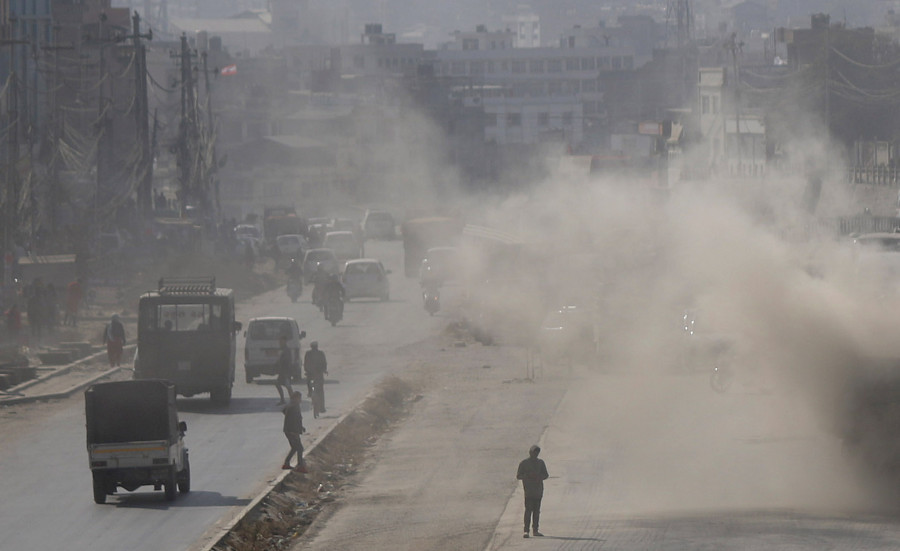Health
Over three million people in Nepal suffer from respiratory problems, but only three percent receive proper treatment
In rural areas, cases of chronic obstructive pulmonary disease are on the rise due to indoor pollution and in cities because of air pollution, say doctors.
Arjun Poudel
A few days ago, a 40-year-old man suffering from breathing problem was brought to the emergency ward of Bir Hospital. Doctors at the hospital carried out necessary tests, including x-ray, which showed that the man from Mugu district was suffering from respiratory failure.
"It’s unusual for a man of his age to have suffered from respiratory failure caused by chronic obstructive pulmonary disease," Dr Ashesh Dhungana, a consultant pulmonologist and head of the chest unit at Bir Hospital, told the Post. “His feet were swollen, and his condition was critical. We put him on noninvasive ventilator support and provided necessary treatment."
The man had to be kept on noninvasive ventilation— a device used in cases of acute and chronic respiratory problems— because his oxygen level had dropped by more than 90 percent. Doctors at the hospital asked him to arrange for oxygen cylinders at home back in Mugu, which was beyond his capacity. The man requested the doctors for discharge, saying he would stay a few days in Kathmandu and then head home.
Like this native of Mugu district, 25.1 percent of the population of Karnali region— which is one in every four people— suffer from chronic obstructive pulmonary diseases, the highest number in the country, according to a recent report of Prevalence of Selected Chronic Non-communicable Diseases in Nepal, carried out by Nepal Health Research Council.
The study points at behavioural risk factors like tobacco use as the main reason for the rise in patients suffering from chronic obstructive pulmonary diseases. Doctors at the hospital, however, said the man from Mugu wasn’t a smoker and had never been one. They attributed his health condition to indoor pollution caused by burning firewood inside the house.
Prevalence of chronic obstructive pulmonary diseases surpassed all non-communicable diseases— coronary artery disease, diabetic, and kidney disease— in the country. About 10 percent of the total deaths across the country are caused by chronic obstructive pulmonary diseases, according to a report published by the Nepal Health Research Council in April 2019.
Meanwhile, 16.4 percent of the total population—which is one in every six people—in Province 2; 14.3 percent—one in every seven people—in Sudurpaschim Province; 11.7 percent—one in every nine people—in Province 3; 9.5 percent—one in every 10 people—in Province 5; 6. 2 percent—one in every 16 people—in Province 1; and 6 percent—one in every 16 people—in Gandaki Province suffer from chronic obstructive pulmonary diseases.
The study shows that over three million people across the country suffer from respiratory problems, but only three percent receive proper treatment.
In rural areas, cases of chronic obstructive pulmonary disease are on the rise due to indoor pollution, and in cities because of air pollution, say doctors.
Doctors say the prevalence of chronic obstructive pulmonary diseases can be lessened by changing behavioural patterns, such as discouraging the use of tobacco and firewood in rural areas, and implementing effective measures to reduce air pollution in the cities.
However, although large numbers of the population have been suffering from respiratory problems, the concerned agencies are yet to pay attention to lessen the prevalence of the disease.
Dr Phanindra Baral, chief of the non-communicable disease section at the Epidemiology and Disease Control Division, said that his office had included respiratory problems in the package of non-communicable diseases along with cardiovascular disease, cancer and diabetes, and it is working to address the problem accordingly.
"We have included the medicines for chronic obstructive pulmonary diseases on the essential drug list and allocated budget for awareness programmes and training at all local levels," said Baral. "The budget is limited, but we are doing our best to address the problem."




 18.12°C Kathmandu
18.12°C Kathmandu















